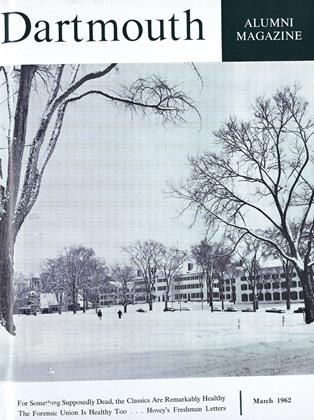By John Pairman Brown '44. Boston: Beacon Press, 1962. 133 pp. $3.50.
Dartmouth graduates who take seriously the Latin on the college seal are bound to approve this book. The author (son of Prof. Bancroft Brown of the Math Department, and himself first in the Class of 1944), is indeed vox clamantis in deserto. What is he crying? A whole string of things, most of them unpopular. That our present civilization has gone terribly wrong. That most of us are to blame. That our hope of salvation, if we have one, will come not from the RAND Corporation or the Trustees of Dartmouth College or even the bishops of the Protestant Episcopal church acting in concert, but rather from the lonely efforts of individual men. (The surviving individualists of our time are the "displaced persons" of his title, and this almanac is a year's worth of advice for them.)
But let the author speak for himself. Here's the sort of thing Mr. Brown has to say, in phrases that sometimes sound a little like an angry Emerson:
On tolerance - "The three-year-old (as somebody said about Homer) praises everything: the falling leaves, the gum-wrapper, the shout from the football field, the bookchute in front of the library. He was perhaps foolish in wanting to be the garbagecollector; has he done better by becoming the teller in the bank? We won't be understanding about the problems of the junior executive, we'll get angry at him; the sociologist is sympathetic because he understands the laws that govern men; we expect men to rise above sociological law."
On the future of nuclear physics - "We suppose it's only our superstitious fantasy that one day all the better atomic physicists will be accused, like Dr. Oppenheimer, of committing political indiscretions, or will actually commit them, and so terminate their science."
On how white men have treated North America - "We've converted our rivers into sewers and our forests into funnybooks; this is our boon from the Gods, everything we touch turns to garbage."
On the present generation in college - "There scuffs a senior in a midwest university; dimly he senses, and forever forgets, that his adviser was lying when he suggested that a major in Psychology would teach him more about people. With sticky palms he puts on his sincere flannel suit to be interviewed by the man from the rubber company; and, abandoning all hope, enters the front door of hell."
All this is strong stuff. Not everyone will like it. That's especially true since Mr. Brown shares with Emerson (and Thoreau) not only their ability to turn a phrase, but also their occasional tendency to be disorganized. And at his angriest he doesn't resemble Emerson at all, but instead writes like a classically educated beatnik.
The book is full of good things, though, and the best of them aim toward the greatest problem of our time how to keep men from dismembering this Earth we live on. As Mr. Brown says at the end of his preface, "It's a small planet, but there are those who love it."
 View Full Issue
View Full Issue
More From This Issue
-
 Feature
FeatureTHE CLASSICS
March 1962 By NORMAN A. DOENGES -
 Feature
Feature...AND MANY DARTMOUTH YESTERDAYS
March 1962 By Edward Connery Lathem '51 -
 Feature
FeatureDartmouth's Debaters Are Arguing Themselves Into National Renown
March 1962 By HAROLD F. BRAMAN '21 -
 Feature
FeatureFund Goal: $1,250,000
March 1962 -
 Feature
FeatureTrustees and Councilors Hold a Combined Meeting
March 1962 -
 Feature
FeatureSome Members of the Board...
March 1962
NOEL PERRIN
-
 Books
BooksWhich Came First?
March 1976 By NOEL PERRIN -
 Cover Story
Cover StoryJonathan Corncob and Other Almost Classics
MAY • 1988 By Noel Perrin -
 Article
ArticleMinor Issues
MAY 1996 By Noel Perrin -
 Article
ArticleOffice Hours
JUNE 1996 By Noel Perrin -
 Article
ArticleDartmouth, Dartmouth, Doing Right
OCTOBER 1996 By Noel Perrin -
 Curmudgeon
CurmudgeonThe Problem with the Dorm-Room Fridge
NOVEMBER 1999 By Noel Perrin
Books
-
 Books
Books"Selected Articles on the Pact
APRIL 1929 -
 Books
BooksRed Man's Burden
March 1975 By BENEDICT E. HARDMAN '31 -
 Books
BooksA NEW DARTMOUTH NOVEL
APRIL 1930 By Boston Transcript -
 Books
BooksIMPLEMENTATION
November 1973 By JAMES COMPTON WICKER '21 -
 Books
BooksMASTER OF THE COURTS.
May 1974 By JOHN HURD'21 -
 Books
BooksViewpoints
JAN./FEB. 1979 By RALPH STEINER '21

